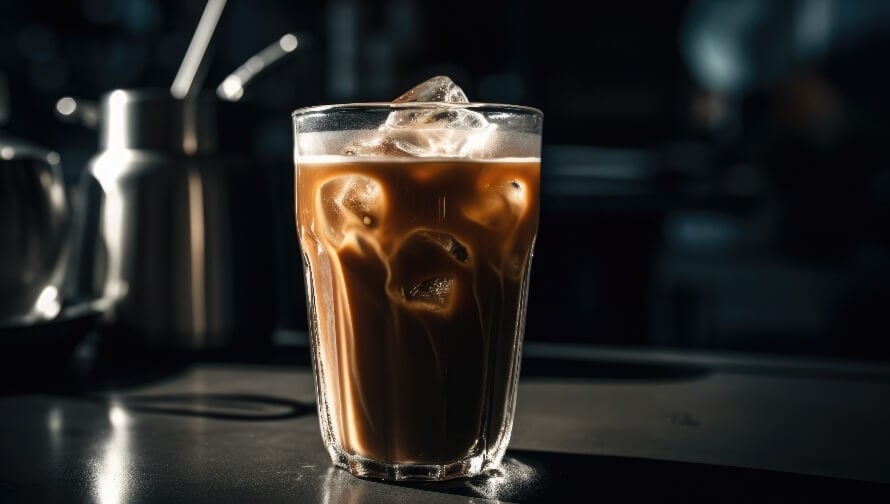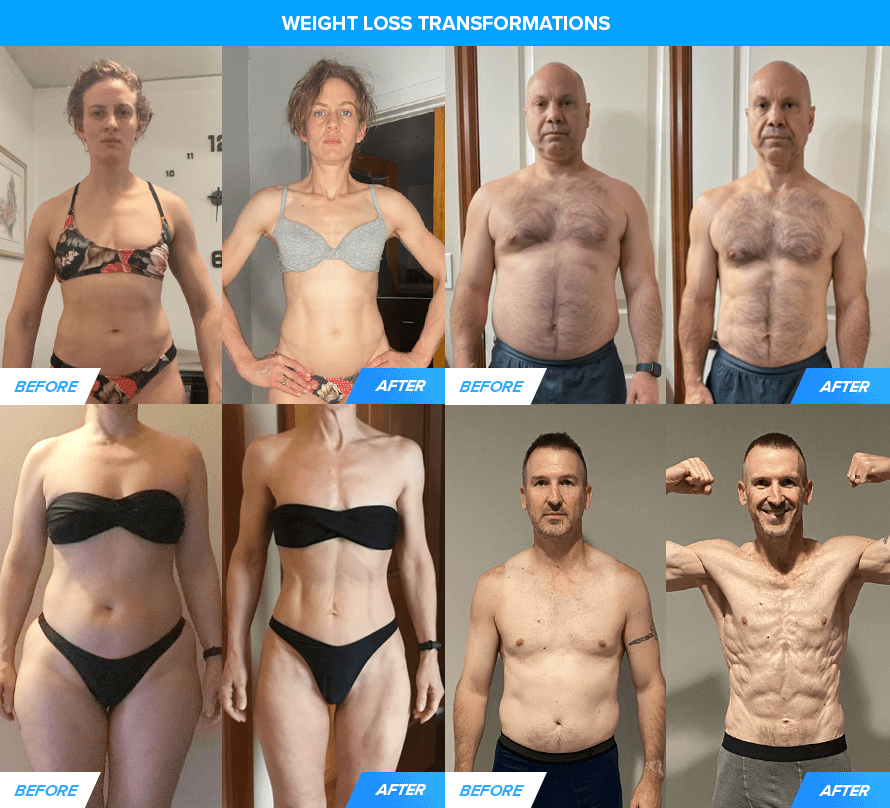“Proffee,” short for “protein coffee,” is a TikTok trend where people mix coffee and protein powder to create a caffeinated, high-protein drink.
Fitness influencers swear by proffee as a weight-loss wonder, claiming it revs up your metabolism, curbs cravings, and keeps you full for hours.
But is high-protein coffee really the magic bullet they say it is?
Here’s what science says.
Key Takeaways
- Proffee is a combination of coffee and protein powder that social media influencers claim can aid weight loss by boosting metabolism and suppressing appetite.
- Research shows that while caffeine and protein can slightly increase fat burning and reduce hunger, the effects are small and short-lived, meaning proffee alone isn’t enough to cause significant weight loss.
- For better results, pair proffee with a calorie-controlled, high-protein diet and regular exercise.
The Standard Proffee Recipe
There isn’t a single way to make proffee—everyone has their own take on the “perfect” protein coffee recipe.
That said, the most basic and popular version involves pouring a protein shake over a cold brew or iced coffee. Other variations mix protein powder directly into hot coffee or blend cold coffee with ice, protein powder, and flavorings like vanilla or caramel.
Why Do People Drink Proffee?
The most commonly touted benefit of proffee is weight loss.
According to social media health and wellness types, high-protein coffee supposedly promotes weight loss in two ways:
- Boosting Metabolism: Both coffee (or more specifically, caffeine) and protein boost your metabolic rate, helping you burn more calories throughout the day.
- Suppressing Appetite: Protein increases satiety, while coffee curbs hunger. This one-two punch means you eat less after drinking proffee.
Does Proffee Boost Weight Loss?

Is proffee as effective for weight loss as influencers claim?
Let’s break it down by looking at what science says about coffee and protein individually.
Does Coffee Boost Metabolic Rate?
Research shows that caffeine increases metabolic rate, which can help you burn fat. For instance, a 2018 meta-analysis published in Critical Reviews in Food Science and Nutrition found that when people doubled their daily caffeine intake, they experienced a 22%, 17%, and 28% greater reduction in body weight, BMI, and body fat, respectively.
An impressive result at first glance—but bear in mind these reductions were relative, not absolute. That is, if you lost 1 pound in a week, doubling your coffee intake might have helped you lose 1.22 pounds.
An improvement, yes, but not a dramatic one.
The review also noted that while these effects were statistically significant, the actual weight loss was modest—around 4 pounds over 12 weeks at best.
In short, drinking a lot more coffee can lead to a little more fat loss, provided you stick with it for several weeks, but the metabolic lift is far smaller and less impactful than high-protein coffee advocates claim.
Does Coffee Suppress Appetite?
Research shows that caffeine may slightly curb hunger, but its effect is probably too short-lived to matter.
For example, a study published in the Journal of the Academy of Nutrition and Dietetics found that while people who consumed caffeine in the morning ate less at breakfast, they made up for it by eating more later in the day.
In other words, caffeine may blunt hunger for a short time, but the overall effect is too small and fleeting to make a meaningful dent in your overall calorie intake. So, like its effect on metabolic rate, caffeine’s influence on appetite won’t lead to substantial fat loss on its own.
Does Protein Boost Metabolic Rate?
Studies show that people who eat more protein while dieting lose more fat than those who eat less, even if the high-protein diet provides more calories overall.
For instance, a study conducted by the University of South Florida found that people who increased their daily protein intake from 0.7 to 1.1 grams per pound of body weight lost around 2.5 pounds of fat in 8 weeks. Surprisingly, they achieved this despite eating 250 more calories each day than usual.
Meanwhile, another group reduced their daily protein intake from 0.7 to 0.4 grams per pound of body weight over the same period. Despite reducing their daily calorie intake by 300 calories, they didn’t lose any fat.
Other studies show that switching to a high-protein diet can help you burn more calories (up to 80 more daily), and that increasing protein intake from ~0.4 to 0.8 grams per pound of body weight can boost fat loss by up to 2.4 pounds over 12 weeks, even if you don’t change anything else about your diet or exercise regimen.
Researchers still don’t fully understand why protein has this effect, but the most accepted theory is that digesting protein increases metabolic rate because it “costs” more calories to process than carbs or fats.
Before you start heaping protein powder into your coffee expecting fat to melt away, here are two things to mull over.
First, while eating protein does increase fat loss, the effect is small. In the studies mentioned, people who ate more protein burned more fat, but the process was slow and wouldn’t have been big enough to noticeably change their appearance.
Second, the people in these studies made big changes to their overall protein intake. Just adding protein to your coffee won’t cut it—you’d need to make protein a much bigger part of your daily diet to see any benefit.
Does Protein Suppress Appetite?
A 2020 meta-analysis published in Physiology & Behavior reviewed 68 studies on protein and hunger. It found that while protein can reduce hunger and increase fullness at first, these effects fade over time—your body gets used to the higher protein intake, and the appetite-suppressing benefits dwindle.
The study also found that protein’s impact on appetite is most noticeable when people eat large amounts—around 35 grams or more per meal.
In other words, drinking high-protein coffee likely won’t make much difference unless you’re also consistently eating other large portions of protein throughout the day. Even then, the effect doesn’t last indefinitely, so relying on protein alone probably isn’t a long-term solution for controlling hunger.
Should You Drink Proffee to Help You Lose Weight?


If you enjoy the taste and convenience of proffee, there’s no harm in having it as part of your weight loss regimen.
That said, don’t expect dramatic weight loss from drinking proffee alone—the combination of caffeine and protein may offer small boosts in metabolism and satiety, but it won’t make a night-and-day difference to your body composition.
To make better progress, follow these steps instead:
- Eat 20-to-25% fewer calories than you burn every day.
- Consume 0.8-to-1 gram of protein per pound of body weight daily.
- Exercise 3-to-5 times per week (mainly strength training).
- Consume 1-to-6 milligrams of caffeine per kilogram of body weight per day.
That’s similar to the approach used by people in Legion’s body transformation coaching program, and the results speak for themselves:


Want to dive deeper into effective weight-loss strategies? Check out our body transformation coaching program or browse our other guides on fast, healthy weight loss:
FAQ #1: Does Proffee really work?
Proffee can play a small role in weight loss, but it’s not a miracle drink. The caffeine may slightly boost your metabolism and fat burning, while the protein may help you feel fuller and cause your body to burn slightly more calories during digestion.
However, the effects of both are modest. So much so that you won’t see results from drinking high-protein coffee alone. To get more significant weight loss results, combine proffee with a calorie-controlled diet and regular exercise.
FAQ #2: How many calories are in proffee?
The calorie count in proffee depends on how you make it. If you use black coffee and a whey protein isolate powder, a proffee will probably contain just over 100 calories.
If, on the other hand, you add extras like milk, cream, flavored syrups, or high-calorie protein powders the calorie content could quickly climb to several hundred calories.
FAQ #3: What’s the best protein powder for high-protein coffee?
Any protein powder can work, but some flavors pair better with coffee than others. For instance, most people prefer vanilla, coffee, or chocolate to fruit flavored protein powder.
For a delicious, low-calorie whey protein isolate that mixes well with coffee, try Whey+.
Scientific References +
- Conger, Scott A., et al. “Does Caffeine Increase Fat Metabolism? A Systematic Review and Meta-Analysis.” International Journal of Sport Nutrition and Exercise Metabolism, vol. 33, no. 2, 2022, pp. 1–9, https://doi.org/10.1123/ijsnem.2022-0131.
- Tabrizi, Reza, et al. “The Effects of Caffeine Intake on Weight Loss: A Systematic Review and Dos-Response Meta-Analysis of Randomized Controlled Trials.” Critical Reviews in Food Science and Nutrition, vol. 59, no. 16, 2019, pp. 2688–2696, www.ncbi.nlm.nih.gov/pubmed/30335479, https://doi.org/10.1080/10408398.2018.1507996.
- Schubert, Matthew M., et al. “Caffeine, Coffee, and Appetite Control: A Review.” International Journal of Food Sciences and Nutrition, vol. 68, no. 8, 27 Apr. 2017, pp. 901–912, https://doi.org/10.1080/09637486.2017.1320537.
- Panek-Shirley, Leah M., et al. “Caffeine Transiently Affects Food Intake at Breakfast.” Journal of the Academy of Nutrition and Dietetics, vol. 118, no. 10, Oct. 2018, pp. 1832–1843, https://doi.org/10.1016/j.jand.2018.05.015.
- Campbell, Bill I., et al. “Effects of High versus Low Protein Intake on Body Composition and Maximal Strength in Aspiring Female Physique Athletes Engaging in an 8-Week Resistance Training Program.” International Journal of Sport Nutrition and Exercise Metabolism, vol. 28, no. 6, 1 Nov. 2018, pp. 580–585, https://doi.org/10.1123/ijsnem.2017-0389. Accessed 26 Feb. 2020.
- Sun, Yue, et al. “Effects of Whey Protein or Its Hydrolysate Supplements Combined with an Energy-Restricted Diet on Weight Loss: A Randomized Controlled Trial in Older Women.” Nutrients, vol. 14, no. 21, 1 Jan. 2022, p. 4540, www.mdpi.com/2072-6643/14/21/4540, https://doi.org/10.3390/nu14214540. Accessed 30 Aug. 2023.
- Oliveira, Camila L. P., et al. “A High-Protein Total Diet Replacement Increases Energy Expenditure and Leads to Negative Fat Balance in Healthy, Normal-Weight Adults.” The American Journal of Clinical Nutrition, vol. 113, no. 2, 18 Nov. 2020, pubmed.ncbi.nlm.nih.gov/33247306/, https://doi.org/10.1093/ajcn/nqaa283.
- Haghighat, Neda, et al. “The Effect of 12 Weeks of Euenergetic High-Protein Diet in Regulating Appetite and Body Composition of Women with Normal-Weight Obesity: A Randomised Controlled Trial.” British Journal of Nutrition, vol. 124, no. 10, 9 June 2020, pp. 1044–1051, https://doi.org/10.1017/s0007114520002019. Accessed 2 May 2021.
- Kohanmoo, Ali, et al. “Effect of Short- and Long-Term Protein Consumption on Appetite and Appetite-Regulating Gastrointestinal Hormones, a Systematic Review and Meta-Analysis of Randomized Controlled Trials.” Physiology & Behavior, vol. 226, Nov. 2020, p. 113123, https://doi.org/10.1016/j.physbeh.2020.113123. Accessed 16 July 2021.

